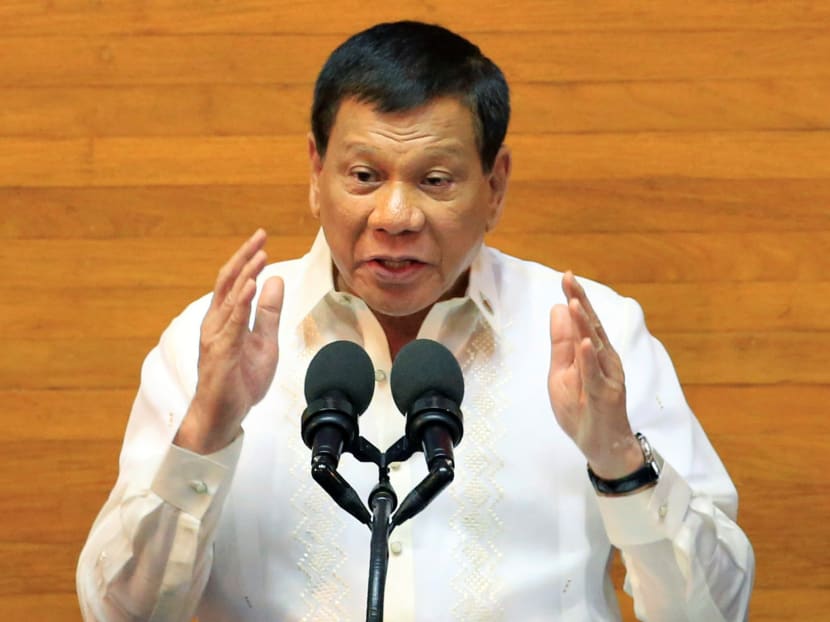Duterte's bid to give away his power raises eyebrows in Manila
MANILA — Few elected world leaders have more constitutional power than Rodrigo Duterte.

Philippine President Rodrigo Duterte gestures as he delivers a speech during an address. Reuters file photo
MANILA — Few elected world leaders have more constitutional power than Rodrigo Duterte.
From Malacaang Palace, Manila's answer to the White House, the Philippines president controls 83 per cent of all public expenditure and appoints 12,000 government officials. US President Donald Trump, by comparison, is responsible for around 4,000 politically appointees and needs Congress to approve his spending proposals.
Even so, Mr Duterte is backing a push to give more power and money to regional governments, which would be the first change to the Philippines constitution since the overthrow of former dictator Ferdinand Marcos in 1986. The proposal would create the position of a prime minister and may scrap restrictions on foreign ownership in some industries.
While Mr Duterte says the move is necessary to boost economic growth and quell a decades-long Muslim insurgency, his opponents see it as a ploy to stay in power. Since taking office in 2016, the 72-year-old leader has launched a deadly drugs crackdown and sought to silence political opponents, drawing the ire of human-rights groups.
"The administration, particularly Duterte, really believes that there will be real political and economic benefits — from better dispersion of growth to less political anger in the more remote areas," said Bob Herrera-Lim, a managing director at Teneo Intelligence, a global political risk advisory firm. "Insofar as allowing the president to serve another term, that's going to be a very big fight."
'NO DICTATORSHIP'
Mr Duterte has repeatedly rejected calls from his allies to extend his six-year term. Last month the House of Representatives passed a resolution to convene both chambers of Congress to draft changes to the country's constitution, which could still include an extension.
"No dictatorship. No extension. I am ready to abbreviate my term," Mr Duterte said on Tuesday (Feb 6).
But his opponents don't believe him. Senator Leila de Lima, Duterte's staunchest critic who was jailed by his administration on drug charges, called on supporters to fight against the plan during a court appearance last month.
"He just wants to stay in power for many years more through federalism," she said. "We all have to be vigilant and not allow this sinister plan."
The Senate now must approve of the amendments before they are put to a public referendum among more the country's 109 million people spread across 7,000 islands. At its quickest, the amendment process will take at least one year.
Under the proposal, as many as 13 new regional governments would take responsibility for planning, development, housing, hospitals, education, infrastructure, water supply and irrigation. Budget allocations for regional and local government would be constitutionally guaranteed at 60 per cent of the national revenue share.
A prime minister would be elected by the national assembly and become head of government, with the authority to choose a cabinet and responsibility for domestic and economic policy. The president would remain head of state, with power over defence, foreign policy, and national security.
FOREIGN OWNERSHIP
To win the business community's support, members of Mr Duterte's ruling PDP Laban party lawmakers are also promising to scrap a constitutional provision capping foreign ownership in some Philippine enterprises at 40 per cent, a rule seen to have deterred investment in areas like telecommunications and even tourism.
"There is a reason that the Philippines attracts only a four per cent share of the foreign direct investment into Asean," said Eduardo Araral, a political economist at Singapore's Lee Kuan Yew School of Public Policy who's advising Duterte's party on the proposal. The amendment could add one or two percentage points to economic growth "each year, every year," he said.
Growth in the Philippines has been among the fastest in the region, staying above 6 per cent since 2012. Advocates of lifting foreign ownership restrictions have predicted a surge in investment and infrastructure spending outside central Manila and the surrounding areas, which produce around 62 per cent of the country's gross domestic product.
Around Asia, decentralisation has seen mixed success. Indonesia, which spread power and money across the archipelago after the fall of Suharto in 1998, saw a surge in graft cases.
"A shift to federalism is a lethal experiment," Former Supreme Court Chief Justice Hilario Davide said at a Senate hearing. "The poor will become poorer. Inevitably, the people will be burdened with more taxes of all kinds to support and maintain the federal bureaucracy."
POTENTIAL NIGHTMARE
Mr Duterte's opponents aren't the only ones raising concerns. Finance Secretary Carlos Dominguez last month acknowledged challenges surrounding taxation and revenue sharing under federalism, telling business leaders "there's a potential for it to become a nightmare."
Much will depend on the final constitutional reform, especially the fiscal arrangements, said Alex Wolf, senior emerging markets economist at Aberdeen Standard Investments.
"Constitutional reform is not a magic wand that will reduce income inequality or reduce the power of political dynasties, but if done well and enough resources are paid to building successful local institutions, a shift towards federalism could decentralize power from Manila and increase economic competition," he said.
Yet even lawmakers who support Mr Duterte are concerned that a new tier of regional governments could end up being taken over by already powerful provincial dynasties.
"Shifting to federalism may strengthen families' hold on local government units," Senator JV Ejercito, the son of former President Joseph Estrada and an ally of the Duterte administration, said in an interview. "We cannot rush the process." BLOOMBERG






